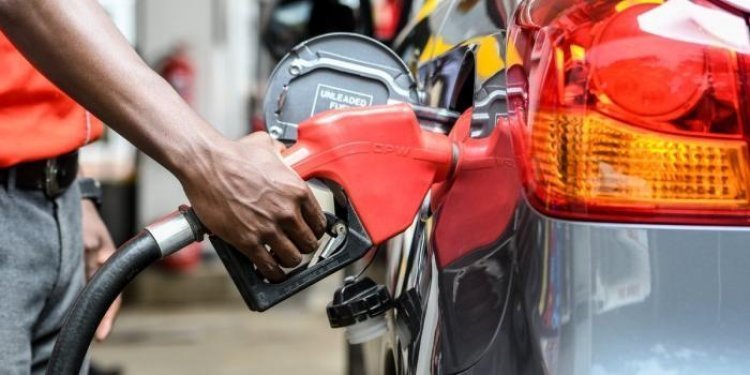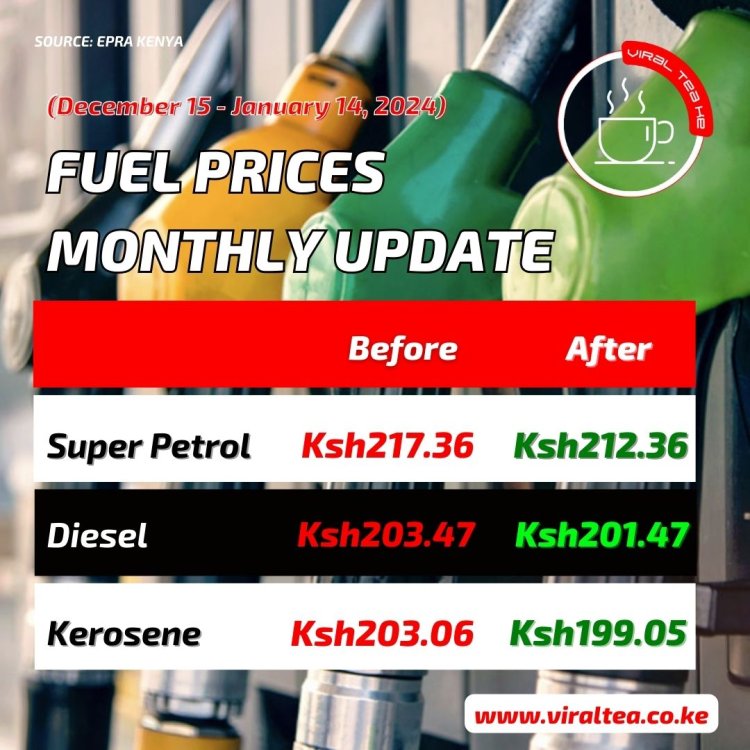EPRA Reduces Fuel Prices Ahead of Christmas
In the latest monthly review, the price of Super Petrol, Diesel and Kerosene decreased by Ksh5, Ksh2 and Ksh4.01 per litre respectively.

The Energy and Petroleum Regulatory Authority (EPRA) has announced the fuel prices for the period between Friday, December 15 and Sunday, January 14, 2024.
In the latest monthly review, the price of Super Petrol, Diesel and Kerosene decreased by Ksh5, Ksh2 and Ksh4.01 per litre respectively, the biggest decrease margin in more than two years.
"In Nairobi, Super Petrol, Diesel and Kerosene will now retail at Ksh212.36, Ksh201.47 & Ksh199.05 effective midnight for the next 30 days.
"The prices are inclusive of the 16% Value Added Tax (VAT) in line with the provisions of the Finance Act. 2023, the Tax Laws (Amendment) Act 2020, and the revised rates for excise duty adjusted for inflation as per Legal Notice No. 194 of 2020," EPRA announced.

New fuel prices as announced by EPRA on November 14, 2023. /VIRALTEAKE
Other than Nairobi, motorists across the country will also get the opportunity to enjoy lowered fuel prices, with those in Kisumu paying Ksh212.12 for a litre of Super Petrol, Ksh201.64 for Diesel, and Ksh199.23 for kerosene.
Those in Mombasa will be charged Ksh209.3 for Super Petrol, Ksh198.41 for Diesel, and Ksh195.92 for Kerosene whereas Nakuru motorists will pay Ksh211.35, Ksh200.88, and Ksh198.46 for Super Petrol, Diesel and Kerosene respectively.
In Eldoret, Kenyans will part with Ksh212.12 (Super Petrol), Ksh201.65 (Diesel), and Ksh199.23 (Kerosene).
"The price of diesel has been cross-subsidized with that of super petrol to further cushion the economy, the government has opted to stabilise the resultant diesel price. Government through the National Treasury has identified resources within the current resource envelope to compensate Oil Marketing Companies," EPRA explained.
The fuel regulator further noted that the landing cost of imported Super Petrol decreased by 16.11 per cent in November, Diesel by 5.43 per cent, and Kerosene by 6.63 per cent leading to a decrease in fuel prices.
The latest review comes amidst huge pressure by Kenyans on President William Ruto's administration to lower the cost of fuel which would in turn lower the cost of living amidst job cuts and freezes pushing scores of Kenyans into an economic black hole.
Critics have cornered the government for hiking the cost of fuel in the country as other countries such as Tanzania continue to register a drop in their fuel prices in response to declining global oil prices.
In particular, Kenyans were grappling with record-high prices as follows: Super Petrol, Diesel and Kerosene retail at Ksh217.36, Ksh205.47 and Ksh205.06 respectively in October.
Energy Cabinet Secretary (CS) Davis Chirchir on Monday, November 6 told the National Dialogue Committee (NADCO) that the Israel-Hamas war could risk pushing up fuel prices in the country to Ksh300 per litre.
However, President William Ruto announced on Saturday, November 18 that Kenyans would enjoy decreased fuel prices in December, days after EPRA began reducing the price of Diesel and Kerosene.
"We have started dealing with the cost of fuel which has gone up everywhere but as Kenya, we made plans. We have looked for ways of ensuring that the price does not get to levels where many Kenyans will be negatively affected.
"You have seen that we have started to reduce the price of fuel. Next month the price will be reduced much more. That will also be the case in January until we get to a sustainable price," he stated.
You have seen that we have started to reduce the price of fuel. Next month the price will be reduced much more- President Ruto#ViralVideos pic.twitter.com/prtT56gWg0 — Viral Tea Ke (@ViralTeaKe) November 18, 2023
It is important to note that Kenya imports all its petroleum product requirements in refined form, which makes the country susceptible to fluctuations in global oil prices and international market dynamics.
Usually, the change in fuel prices is a ripple effect, with any increase in fuel prices triggering possible increases in the cost of matatu fares, food, transportation and power generation operational costs, which include the transportation and logistics sectors, which are vital for the distribution of goods across the country.

 admin
admin 




